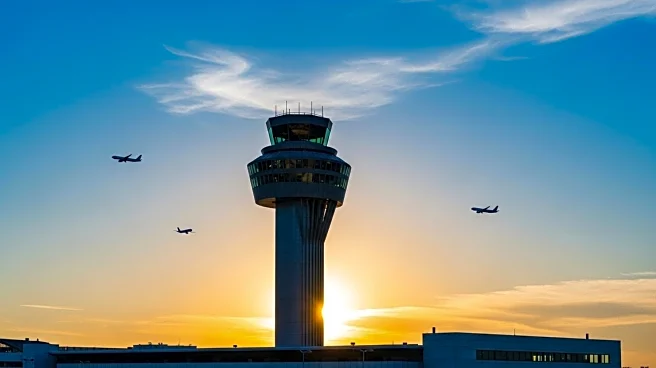What's Happening?
Eurocontrol has reported a significant increase in air traffic over the summer, with the Maastricht Upper Area Control Center (MUAC) handling 677,010 flights, marking the highest volume since the pandemic. Despite the surge, average delays per flight were kept under control, attributed to effective staffing and management strategies. Eurocontrol is actively recruiting over 100 student air traffic controllers to maintain and enhance its operational capacity. A new daily traffic record was set on July 4, with 5,831 flights managed, surpassing the previous record from 2018. The busiest month was July, with 173,977 flights, and August saw a 3% increase in traffic compared to the previous year. Eurocontrol aims to keep delays below the EU target of 0.31 minutes per flight.
Why It's Important?
The efficient management of increased air traffic is crucial for the aviation industry, particularly as it recovers from the pandemic. Eurocontrol's ability to handle record traffic with minimal delays demonstrates the effectiveness of its operational strategies and staffing levels. This is significant for European airlines, which have expressed concerns over air traffic control delays. While some airlines, like Volotea, have noted improvements, others, such as Ryanair, continue to criticize the system and call for reforms. The ongoing recruitment and training of air traffic controllers are vital for sustaining and improving service levels, ensuring that the aviation sector can meet future demands and maintain safety and efficiency.
What's Next?
Eurocontrol plans to conduct a detailed review of the summer 2025 operations to inform future strategies. The anticipated increase in air traffic will require robust planning to address capacity challenges. The organization is focused on meeting the needs of all airspace users, balancing civil and military requirements. Meanwhile, discussions around air traffic control reforms continue, with calls for mandatory staffing levels and protection of overflights during national strikes. These reforms are seen as essential for improving the overall efficiency and reliability of Europe's air traffic management system.
Beyond the Headlines
The ongoing debate over air traffic control reforms highlights broader issues within the European aviation sector, including the need for modernization and increased resilience against disruptions. The push for reforms reflects a desire for a more integrated and efficient airspace management system, which could have long-term benefits for airlines and passengers alike. Additionally, the recruitment and training of new air traffic controllers underscore the importance of investing in human resources to support technological advancements and operational demands.











